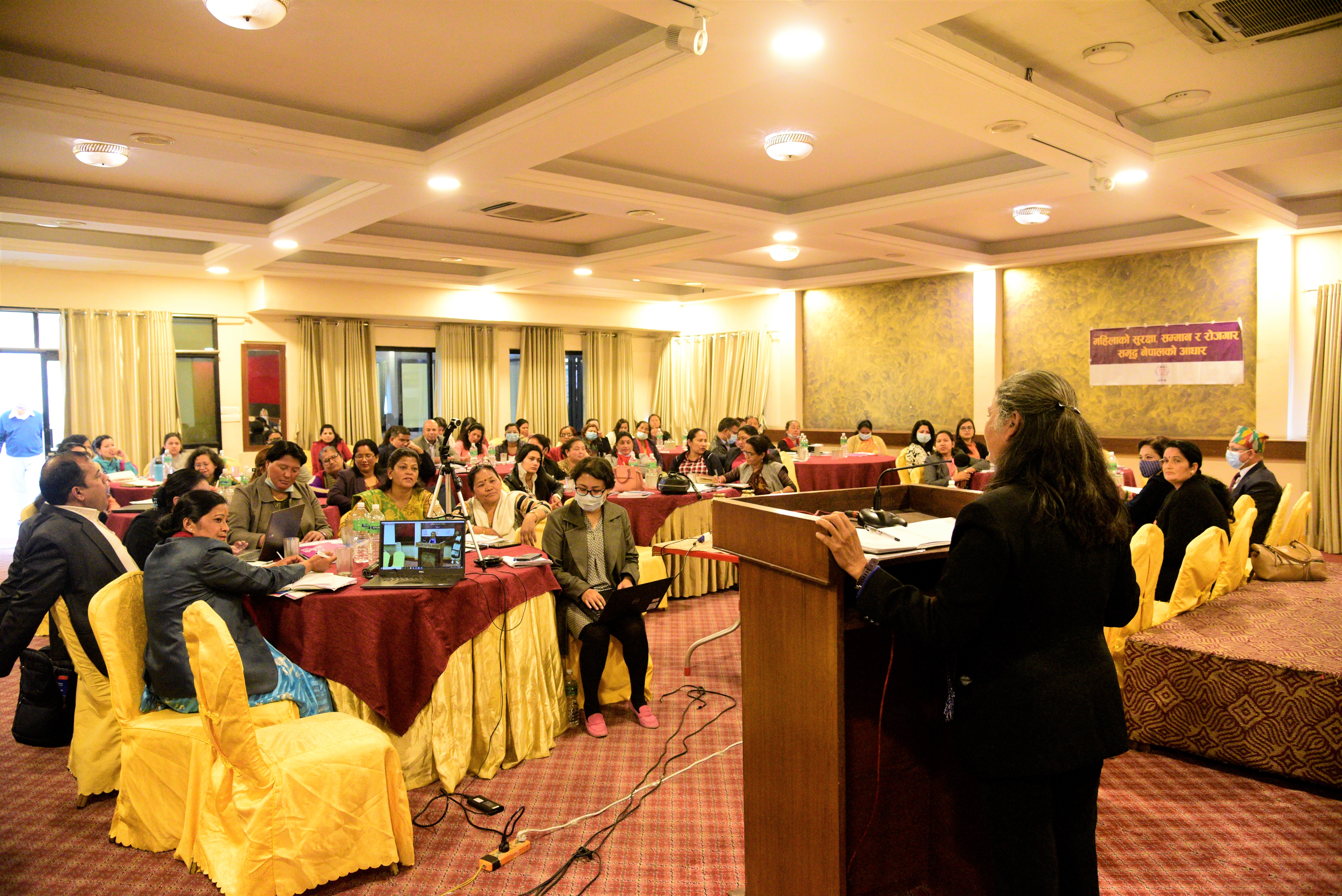
To mark the International Working Women’s Day 2021, WOREC, Care Nepal and The Nepal Association of Rural Municipalities in Nepal jointly organized a National Consultation on “Issues of Working Women: Roles and Responsibilities of the Local Government” on March 10. Around 73 participants attended the consultation, including civil society representatives, government representatives, and municipality representatives from 7 provinces across the country.
The consultation was organized to provide a platform for the concerned stakeholders to express their views, challenges, and recommendations on the issues related to working women in Nepal and how these issues have been incorporated in Rural Municipalities’ plans and policies.
Speaking at the program, Binda Pandey, a member of parliament, stated that the government has failed to respect, protect and fulfil women’s freedom to movement by imposing a blanket ban on women from migrating overseas for employment.
“In the pretext of protecting women from potential abuses during labour migration, the Nepal government has been imposing restrictions on women’s movement for the last two decades. While imposing all these bans, Nepal has not only failed to show its responsibility in protecting women’s right to mobility but also such blanket ban policy has encouraged women workers to take illegal routes, leaving them vulnerable to trafficking and abuse,” Pandey said.
Binda Pandey, a member of parliament, speaking at the Consultation program organized by WOREC to mark International Working Women's Day on 10th March.
Pandey further said that instead of restricting women from migrating abroad for employment, the Nepal government and the destination countries should seriously consider ways to protect them from exploitation.
“While the governments of both countries need to have bilateral agreements in place regarding the protection of women workers, the government in both local and national levels should also invest in providing awareness and orientation programs to improve women’s access to the information regarding the culture and laws of the host countries. This would help them make more informed decisions both before and after migration,” said Pandey.
Talking about the reintegration of returned women migrant workers (RWMWs) in society, Harishchandra Ghimire, Joint Secretary of the Ministry of Foreign Affairs, said that the government should develop plans and strategies to promote the employment of RWMWs.
“The government and the civil society should develop plans that should include measures for either utilizing the skills the RWMWs bring back or providing them with other skills and technologies required to lead productive lives,” said Ghimire.
According to the finding of a 2019 UN report, since most working migrant women are engaged as domestic workers, upon returning to Nepal, many women don’t consider their experience or skills gained abroad as having the potential to helping them find decent employment in their locality. As a result, most RWMWs either remain unemployed or are engaged in unskilled occupations or informal activities upon return.
The participants in the consultation also pointed out that the value of women’s unpaid activities should be fully recognized and quantified as the contribution to the national economy.
Due to gendered social norms and institutions, women spend a disproportionate amount of time on unpaid care work in their households, and their contribution goes unrecognized. According to the Nepal Labour Force Survey 2017-18, only 22 percent of working-age women were employed, but the survey did not consider unpaid housework or subsistence farming as employment.
As most of the women are employed in the informal sector and elementary jobs, there is a huge gap in wages paid to males and females, according to the survey. The survey shows that the average monthly income of women is Rs5,834 less than that of men. Males earn Rs19,464 on average, while females are being paid Rs13,630 regardless of their profession.
Nepal has always struggled with achieving equality between men and women when it comes to women’s rights, women’s health and women’s economic status. However, various reports have suggested that the Covid-19 pandemic has just aggravated those inequalities.
The economic fallout caused by the current public health emergency has hit women the hardest by leaving them unemployed and financially at a loss.
A 2017-18 Nepal Labour Force Survey points out that the areas that most of the working females are employed in are agriculture, wholesale, retail trading, education and hospitality sectors-all of sectors that are heavily affected by the lockdown following the Covid-19 outbreak.
While women are suffering from heavy financial loss due to unemployment, they are also reported to be falling heavily into unpaid caring labour, which is not even considered as employment by Nepal Labour Force Survey.
The participants also discussed how the lockdown had put additional strain on inequalities by reinforcing existing gender roles at the household level. In an attempt to fulfil their gender roles, women are expected to constantly nurse children, who are at home due to school being shut down and care for their husbands and laws. There have also been news reports on how the gendered division of labour has taken a toll on women where they are expected to juggle between working from home and taking care of their entire support networks.